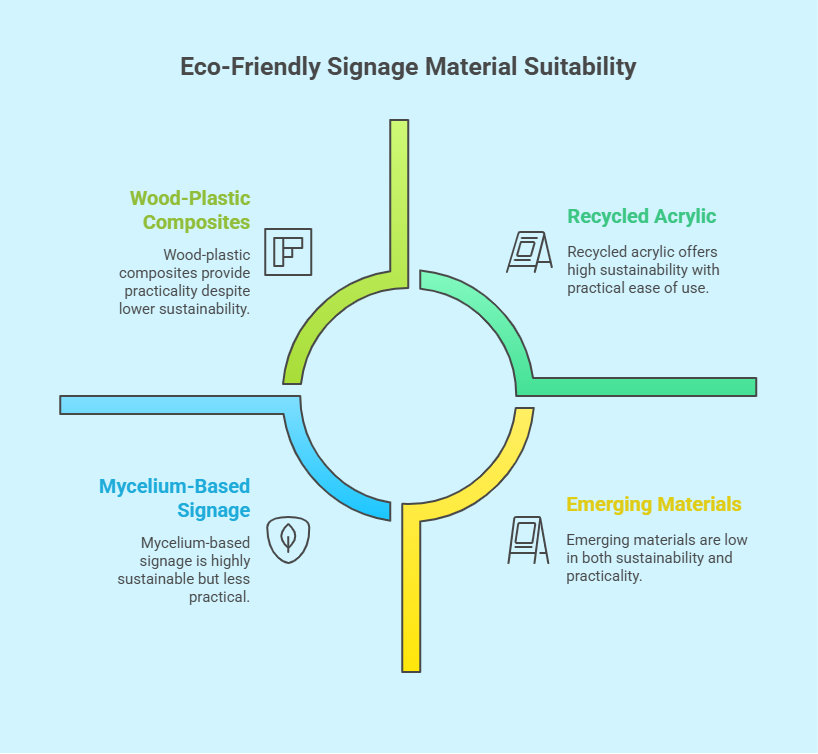Sustainability is no longer a buzzword, it’s a standard that customers, companies, and entire industries are beginning to expect. For sign makers, this shift presents a valuable opportunity to align services with growing environmental priorities without compromising on quality or performance. Whether you’re creating signage for retail spaces, commercial buildings, or public sector projects, choosing eco-conscious materials can now be a key factor in winning tenders and building long-term client trust.
At the heart of this transition are materials that offer the same strength, finish, and fabrication ease as traditional substrates but are designed with sustainability in mind, made from recycled content, biodegradable, or sourced from renewable resources. As a trade supplier focused exclusively on the needs of sign professionals, Cherwell Sign Supplies has developed a comprehensive offering of eco-friendly signage materials to help you meet demand and build responsibly.
Why Sustainable Materials Matter to Sign Makers
The move toward sustainable signage isn’t just driven by environmental concern, it’s being propelled by market expectations and competitive realities. More and more clients are now factoring sustainability into their procurement processes, especially in sectors like retail, education, healthcare, and local government. These organisations often have clear sustainability goals, and they’re actively seeking suppliers who can support them. As a sign maker, being able to offer eco-friendly options can make the difference between winning and losing a contract.
Additionally, environmental certifications like BREEAM and LEED are increasingly common in commercial property development. These standards often require low-impact materials and encourage recyclable or reusable signage systems. Having a portfolio of sustainable signage materials puts you in a strong position to serve these projects.
But the benefits go beyond meeting client expectations. Sustainable signage solutions can also streamline production, reduce waste, and improve margins over time. Choosing long-lasting, easily recyclable substrates reduces both material costs and the need for replacements. For sign makers aiming to stand out in a crowded market, promoting eco-friendly offerings is not just good for the planet, it’s good for business.

Eco-Friendly Signage Materials Available at Cherwell
Cherwell Sign Supplies offers a curated range of sustainable materials designed specifically for sign makers. These substrates have been chosen not just for their environmental credentials, but also for their practical performance in real-world sign production. Whether you’re producing shop fascia panels, internal display signs, or wayfinding systems, there are eco-friendly alternatives available that perform just as well as traditional materials, sometimes better.
a. Recycled Acrylic
Recycled acrylic is one of the most practical, sustainable materials for signage. It offers the same clarity, durability, and fabrication ease as virgin acrylic, making it suitable for a wide range of applications, from flat cut letters to illuminated panels. The key difference is that it’s made from recycled pre-consumer or post-industrial waste, reducing the demand for raw petroleum-based input.
For sign makers already using acrylic in their work, this swap requires no major changes to tooling or finishing processes. It routes, laser-cuts, and bonds in the same way as standard cast or extruded sheets. Choosing recycled acrylic allows you to maintain high-quality results while minimising your environmental impact.
b. Polygood Panels
Polygood is a decorative sheet material made entirely from recycled polystyrene waste, both consumer and industrial. Each panel is unique, with marbled and speckled surface patterns that make it ideal for signage projects where appearance matters. It’s particularly effective in hospitality, interior branding, and high-traffic commercial spaces where clients want something visually striking as well as sustainable.
Polygood is a durable, weather-resistant sheet that works well with CNC routing and mechanical fixing methods. Because of its rigidity and bold appearance, it’s especially suitable for sign makers offering premium or bespoke installations.
c. Wood-Plastic Composites (WPCs)
WPCs combine recycled wood fibers and plastics into a tough, moisture-resistant material that resembles timber but performs far better in outdoor conditions. Unlike real wood, WPCs won’t split, warp, or rot over time. That makes them ideal for exterior signs, directional posts, and heritage-style signage with a natural finish.
They’re also easy to work with, WPC boards can be routed, painted, or laminated just like other rigid panels. For sign makers serving customers in rural, eco-branded, or outdoor environments, WPCs offer a great balance of durability and green credentials.
d. Mycelium-Based Signage
For sign makers looking to push the boundaries of sustainability, mycelium-based substrates offer a truly organic solution. Mycelium, the root structure of fungi, is grown into rigid, lightweight forms that can be shaped into display boards or panels. The result is a biodegradable, fully compostable material that’s ideal for short-term signage or event displays.
While still an emerging option in the market, mycelium boards appeal strongly to clients with deep sustainability goals, such as eco-conscious brands or green-certified events. They bring a natural texture and story to any project, and open up creative new avenues for environmentally inspired signage.
e. Other Emerging Materials
Cherwell also keeps pace with innovations in sustainable substrates, exploring materials like algae-based plastics and plant-derived biopolymers. While not yet mainstream, these materials are being trialed for signage applications where ultra-low environmental impact is the priority.
Being aligned with a supplier like Cherwell means staying informed about what’s coming next, and being ready to integrate new materials as they become commercially viable.
Related: 4 Reasons Why Recycling Matters In The Signage Industry
Working with Sustainable Substrates
Switching to eco-friendly materials doesn’t mean compromising on quality or usability. In fact, many of the sustainable signage substrates available through Cherwell are specifically designed to integrate seamlessly into existing production workflows. For sign makers, this means you can continue to use the same fabrication equipment, like CNC routers, laser cutters, and flatbed UV printers, without needing to invest in new tools or processes.
For instance, recycled acrylic sheets cut, engraved, and glued just like traditional acrylic, while Polygood panels can be routed and edge-finished using standard tooling. Wood-plastic composites can be screwed, planed, and painted, offering the familiar handling of timber without the long-term maintenance concerns. Even more unconventional materials like mycelium boards can be cut and mounted easily for temporary display use.
Another key advantage of working with sustainable materials is their suitability for modular signage design. Using substrates that are durable and recyclable allows sign makers to build systems that can be updated or reconfigured over time, reducing waste, extending product lifespans, and supporting clients’ own green goals.
Sign makers can also reduce waste in production by using sheet offcuts for smaller components, or by choosing panel sizes that better match typical sign dimensions. Cherwell’s range includes options in various thicknesses and formats, helping you optimise material usage and minimise offcut loss.
Ultimately, these materials aren’t just eco-friendly, they’re trade-friendly. They’re tested, durable, and reliable in real-world applications, meaning you can offer sustainable options to your clients with confidence and without disruption to your workflow.
Why Buy from Cherwell Sign Supplies
Not all signage suppliers are the same. Cherwell Sign Supplies is a UK-based, trade-only supplier focused on supporting sign makers with sustainable, high-quality materials. Their curated range includes recycled acrylics, Polygood, WPCs, and more, all in stock and ready for fast dispatch.
Cherwell goes beyond just supplying eco-friendly substrates. They offer expert advice and technical support tailored to the needs of signage professionals. If you’re working on a sustainability-focused tender or aiming to reduce waste, their team can help you select the right materials.
Sustainability is embedded in Cherwell’s sourcing and supply practices, with a focus on durability, recyclability, and low waste. This means you can meet your clients’ green targets without compromising on quality or performance.
Conclusion
Eco-friendly materials are no longer just an option, they’re becoming a standard expectation in professional sign making. As more businesses and public sector clients look for suppliers who support sustainable practices, sign makers have a chance to lead by offering innovative, low-impact signage solutions.
With materials like recycled acrylic, Polygood, WPCs, and biodegradable options now readily available, there’s no need to compromise on durability or design. These substrates work seamlessly with your current production tools, allowing you to stay competitive while reducing your environmental footprint.
To explore the full range of sustainable signage materials and discover how they can support your projects, visit Cherwell’s Eco-Friendly Signage Solutions. Whether you need guidance, specifications, or just a reliable trade partner, Cherwell has you covered.


